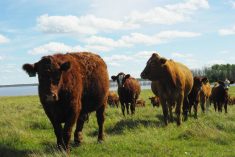CHICAGO, April 13 (Reuters) – Ranchers and meat processors in the northern U.S. Plains on Friday braced for a powerful late winter storm that poses a risk to newborn calves, while also threatening to strand hogs on farms and temporarily shut down some packing plants.
High winds and several inches of snow were expected hit parts of Montana, North and South Dakota and Nebraska by late Friday afternoon before moving eastward into Iowa and Minnesota, according to the National Weather Service.
Northern Plains states are noted for their cow/calf ranches. Cattle feedlots are located throughout Nebraska – the second ranked cattle producing state. Iowa and Minnesota have the largest concentration of hog operations in the nation.
Read Also

Farming Smarter receives financial boost from Alberta government for potato research
Farming Smarter near Lethbridge got a boost to its research equipment, thanks to the Alberta government’s increase in funding for research associations.
Most cattle in commercial feedyards can withstand the cold and snow, said industry experts, but the severe weather poses a threat to cows in the north-central Plains giving birth to calves.
“Calves being born in the winter weather is a lot of hard work to keep them alive,” said Colorado-based Livestock Marketing Information Center director Jim Robb.
As a precaution, animals are closely monitored, said Robb. Calves that get cold are brought indoors to barns and sometimes into ranchers’ homes to keep warm, he added.
Unlike cattle, most hogs in the United States are raised inside temperature controlled buildings. But transporting livestock over ice packed roads and in blizzard conditions can delay delivery of the animals to meat packers, such as Tyson Foods and Cargill.
To avoid disruptions, some processors may request that livestock be delivered before the storm or shutter operations until severe weather passes.
No Cargill meat plant closures are anticipated at this time as the company monitors the situation, Cargill said in a statement to Reuters.
Tyson Foods could not be immediately reached for comment Friday.
Gregg Hora, an Iowa hog farmer and president of the state’s Pork Producers Association, said there is always concern when transporting live animals in treacherous driving conditions.
But, he said, trucking companies and pig farmers take extra precautions to minimize any transportation disruptions and animal welfare concerns.
“We’re pretty well adapted to this as pig farmers and cattle farmers,” said Hora.

















